The Must-Needed Chemicals To Keep Your Pool Clean And Healthy
A swimming pool in the backyard of your home is a good investment to increase the charm and value of your home and to get the praise of your neighbours. But to keep it as a point of pride in your home, it is necessary to keep it clean, sparkling, and healthy. A dirty pool not only makes guests wrinkle their noses but can also cause serious health problems for your family.
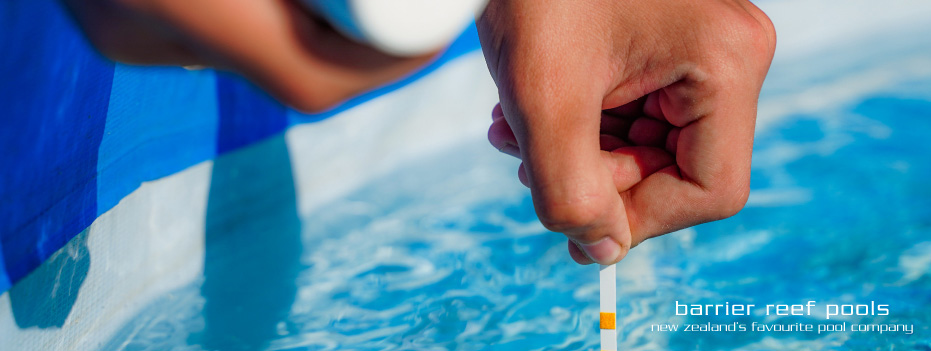
Cleaning the swimming pool does not mean just clearing out the debris and other solid waste in it. Maintaining the pool's water chemistry and adding the required chemicals at regular intervals is one of the most crucial parts of keeping the pool clean. There are some basic chemicals that are indispensable for any swimming pool.
Chemicals for your swimming pool
The important chemicals needed to keep your pool clean and healthy can be broadly classified into four types. These include:
- Water balancers
- Sanitisers
- Oxidisers
- Specialty chemicals
Water balancers
They can be used to change the amount of chemicals in the pool water. These balancers help keep your pool’s water chemistry balanced and optimal. You should also test your pool water weekly to decide how often you should add the balancers to your swimming pool. The different balancers include:
- Chlorine neutraliser
This is used to decrease the concentration of chlorine in the swimming pool when it becomes higher than the recommended amount. The most common compound used is Thiosulfate. In 10,000 gallons of pool water, one pound of thiosulfate will reduce the free chlorine concentration by around 10 ppm.
- pH reducer or increaser
You should always balance the pH of the water in your swimming pool. When the pH becomes low, it can lead to corrosion of the pool equipment and the pool surface. Using pH Up can help raise the pH when it is lower than 7.2. If the pH rises above 7.6 ppm, it can cause issues like cloudy water, scaling, and deposits. You can utilise pH Down to reduce it.
- Calcium hardness
This indicates the calcium concentration in the swimming pool. If calcium levels are low, it can cause corrosion and damage to metal parts coming into contact with the water. This can be avoided by using a calcium hardness increaser. High levels of calcium are also undesirable as they can lead to cloudy water. You can try using muriatic acid or pool flocculant to bring the calcium levels to the optimal value.
- Alkalinity balancers
You should keep your swimming pool’s total alkalinity between 120 and 150 ppm to make sure that the pH stays steady. Low alkalinity can promote staining and corrosion. High alkalinity can also contribute to scaling and cloudy water. It is advisable to use an alkalinity increaser to boost the overall alkalinity.
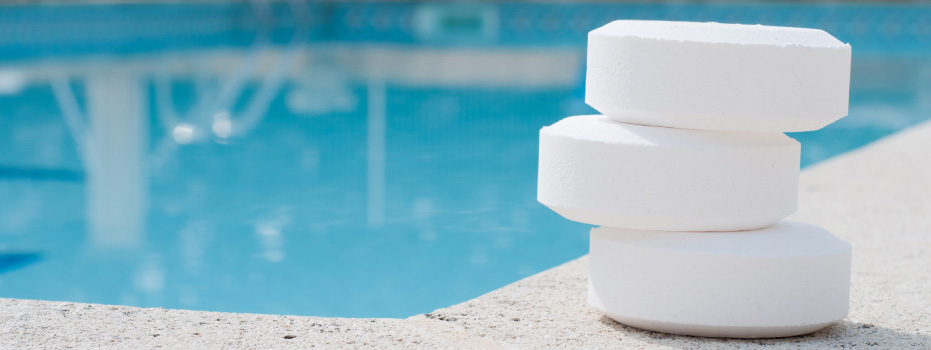
Sanitisers
These are compounds that keep your pool water clean and disinfect it. Your swimming pool water must always have a minimum quantity of sanitiser. If this requirement is not properly taken care of, your pool can become susceptible to numerous issues.
- Chlorine
The true powerhouse of pool upkeep is chlorine, which is responsible for eliminating bacteria and sanitising the pool water. The optimal level of free chlorine in the swimming pool is between 1 and 3 ppm. If you are worried about degradation due to exposure to sunlight, you can use products with stabilised chlorine. The majority of stabilised chlorine products come in a range of shapes and sizes, including sticks, tablets, and granules. Trichlor, which is available as both sticks and tablets, is a common product available on the market.
- Bromine
Bromine also has antibacterial properties comparable to those of chlorine, and it works especially well in warm water. It also has excellent stability when used in warm water, so you need not worry about degradation. If you have a spa, hot tub, or like to keep your pool water warm, then bromine is a good sanitiser for you. You can also install an automatic brominator to use bromine efficiently.
Oxidisers
Oxidisers, also called pool shocks, are one of the most effective pool water cleansers. They are employed for intensive and focused sanitising procedures. They are frequently used prior to and after periods of intense pool use and following periods of extreme weather for pool maintenance. They are also used after any situation in which the pool water has been exposed to pollutants. It is advisable to use an oxidiser every two weeks if you regularly use the pool to keep it clean.
You can also use chlorine-free oxidisers for your pools and spas. They are a group of potassium salts that are highly effective as oxidisers. They do not leave any residue and dissolve in the pool water easily. This means there is no wait time before you can use the pool again. It is also important to remember that you should use a chlorine-free oxidiser if your sanitiser is bromine. This is because chlorine and bromine do not go well together.
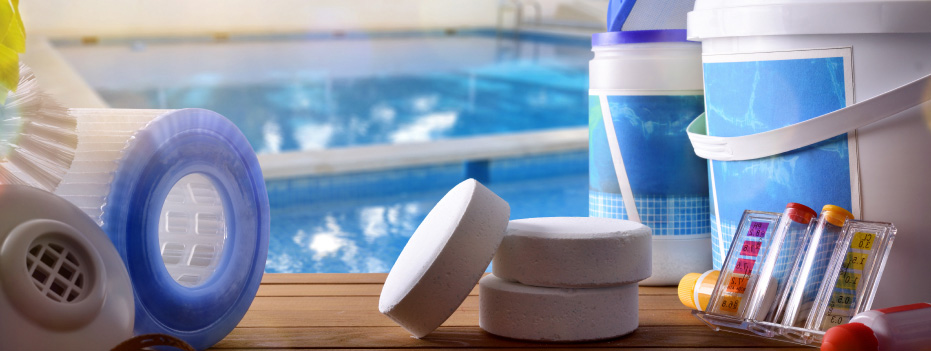
Specialty Chemicals
These are chemicals that are not used frequently but are still required to avoid pool safety issues.
- Algaecide
The secret to a good pool is to keep algae from growing in it. Algaecides serve as a support to your regular sanitisation routine by stopping the onset and growth of algae in your pool. It is also important to add algaecide after each shock treatment.
- Pool enzymes
These chemicals are needed to break down non-living natural contaminants in the pool water, like oils.
- Filter cleaners
These chemicals can be used to clean all three kinds of filters, including sand, cartridge, and diatomaceous earth filters. They clean the debris clogging your filters, like oils, metals, and minerals.
Wrapping Up
Installing a swimming pool in the backyard is one of the best ways to make your home charming and beautiful. But to maintain the beauty of the pool and avoid health issues, it is crucial to follow the right steps to maintain it. Along with cleaning the pool, it is also important to maintain the pool water chemistry to keep the pool sparkling and healthy.
The Must-Needed Chemicals To Keep Your Pool Clean And Healthy
A swimming pool in the backyard of your home is a good investment to increase the charm and value of your home and to get the praise of your neighbours. But to keep it as a point of pride in your home, it is necessary to keep it clean, sparkling, and healthy. A dirty pool not only makes guests wrinkle their noses but can also cause serious health problems for your family.
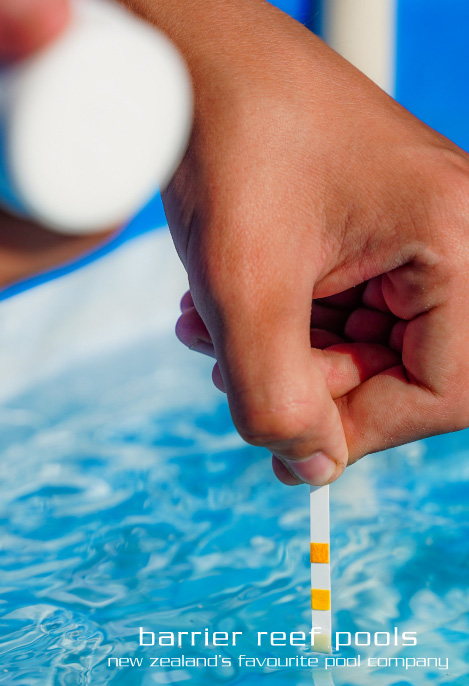
Cleaning the swimming pool does not mean just clearing out the debris and other solid waste in it. Maintaining the pool's water chemistry and adding the required chemicals at regular intervals is one of the most crucial parts of keeping the pool clean. There are some basic chemicals that are indispensable for any swimming pool.
Chemicals for your swimming pool
The important chemicals needed to keep your pool clean and healthy can be broadly classified into four types. These include:
- Water balancers
- Sanitisers
- Oxidisers
- Specialty chemicals
Water balancers
They can be used to change the amount of chemicals in the pool water. These balancers help keep your pool’s water chemistry balanced and optimal. You should also test your pool water weekly to decide how often you should add the balancers to your swimming pool. The different balancers include:
- Chlorine neutraliser
This is used to decrease the concentration of chlorine in the swimming pool when it becomes higher than the recommended amount. The most common compound used is Thiosulfate. In 10,000 gallons of pool water, one pound of thiosulfate will reduce the free chlorine concentration by around 10 ppm.
- pH reducer or increaser
You should always balance the pH of the water in your swimming pool. When the pH becomes low, it can lead to corrosion of the pool equipment and the pool surface. Using pH Up can help raise the pH when it is lower than 7.2. If the pH rises above 7.6 ppm, it can cause issues like cloudy water, scaling, and deposits. You can utilise pH Down to reduce it.
- Calcium hardness
This indicates the calcium concentration in the swimming pool. If calcium levels are low, it can cause corrosion and damage to metal parts coming into contact with the water. This can be avoided by using a calcium hardness increaser. High levels of calcium are also undesirable as they can lead to cloudy water. You can try using muriatic acid or pool flocculant to bring the calcium levels to the optimal value.
- Alkalinity balancers
You should keep your swimming pool’s total alkalinity between 120 and 150 ppm to make sure that the pH stays steady. Low alkalinity can promote staining and corrosion. High alkalinity can also contribute to scaling and cloudy water. It is advisable to use an alkalinity increaser to boost the overall alkalinity.
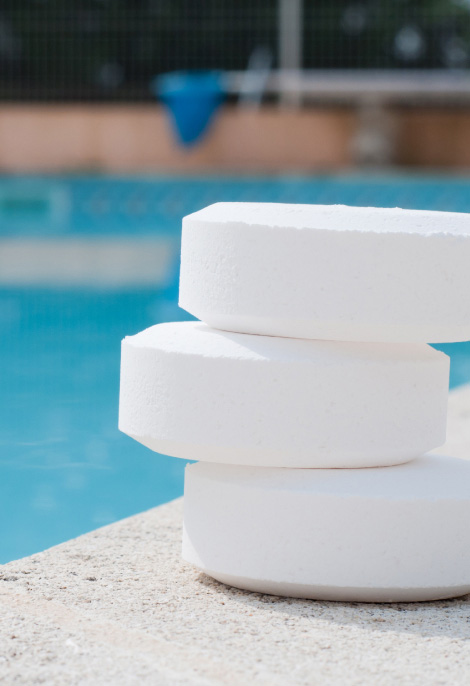
Sanitisers
These are compounds that keep your pool water clean and disinfect it. Your swimming pool water must always have a minimum quantity of sanitiser. If this requirement is not properly taken care of, your pool can become susceptible to numerous issues.
- Chlorine
The true powerhouse of pool upkeep is chlorine, which is responsible for eliminating bacteria and sanitising the pool water. The optimal level of free chlorine in the swimming pool is between 1 and 3 ppm. If you are worried about degradation due to exposure to sunlight, you can use products with stabilised chlorine. The majority of stabilised chlorine products come in a range of shapes and sizes, including sticks, tablets, and granules. Trichlor, which is available as both sticks and tablets, is a common product available on the market.
- Bromine
Bromine also has antibacterial properties comparable to those of chlorine, and it works especially well in warm water. It also has excellent stability when used in warm water, so you need not worry about degradation. If you have a spa, hot tub, or like to keep your pool water warm, then bromine is a good sanitiser for you. You can also install an automatic brominator to use bromine efficiently.
Oxidisers
Oxidisers, also called pool shocks, are one of the most effective pool water cleansers. They are employed for intensive and focused sanitising procedures. They are frequently used prior to and after periods of intense pool use and following periods of extreme weather for pool maintenance. They are also used after any situation in which the pool water has been exposed to pollutants. It is advisable to use an oxidiser every two weeks if you regularly use the pool to keep it clean.
You can also use chlorine-free oxidisers for your pools and spas. They are a group of potassium salts that are highly effective as oxidisers. They do not leave any residue and dissolve in the pool water easily. This means there is no wait time before you can use the pool again. It is also important to remember that you should use a chlorine-free oxidiser if your sanitiser is bromine. This is because chlorine and bromine do not go well together.
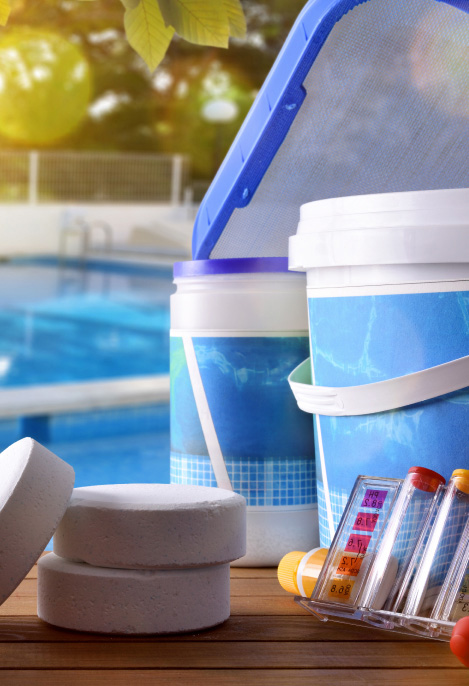
Specialty Chemicals
These are chemicals that are not used frequently but are still required to avoid pool safety issues.
- Algaecide
The secret to a good pool is to keep algae from growing in it. Algaecides serve as a support to your regular sanitisation routine by stopping the onset and growth of algae in your pool. It is also important to add algaecide after each shock treatment.
- Pool enzymes
These chemicals are needed to break down non-living natural contaminants in the pool water, like oils.
- Filter cleaners
These chemicals can be used to clean all three kinds of filters, including sand, cartridge, and diatomaceous earth filters. They clean the debris clogging your filters, like oils, metals, and minerals.
Wrapping Up
Installing a swimming pool in the backyard is one of the best ways to make your home charming and beautiful. But to maintain the beauty of the pool and avoid health issues, it is crucial to follow the right steps to maintain it. Along with cleaning the pool, it is also important to maintain the pool water chemistry to keep the pool sparkling and healthy.


